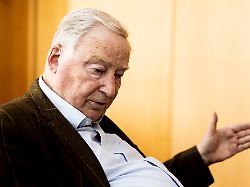Maybrit Illner’s ZDF talk show provides a review of the NATO summit in the Lithuanian capital of Vilnius. The fact that it becomes a controversial discussion is mainly due to one guest: the AfD honorary chairman Alexander Gauland.
It’s Thursday evening and the talk show with Maybrit Illner is on ZDF. The invited four guests to talk about the NATO summit that took place this week in the Lithuanian capital Vilnius. It also discussed prospects for Ukraine joining NATO. President Volodymyr Zelenskyj had previously insisted that his country receive an invitation for the post-war period. Nothing came of it, Chancellor Olaf Scholz and American President Biden did not bring themselves to support it. A statement said that Ukraine’s future was in NATO. But an official invitation is only possible when the allies agree and the requirements are met. The guests at Illner disagree on this, as well as on most of the other points that are raised. This is mainly due to one guest: the AfD honorary chairman Alexander Gauland.
“I was glad that Chancellor Scholz and US President Biden made sure that Ukraine was not admitted to NATO,” says Gauland. His party is fundamentally opposed to NATO expanding to the Russian border. The path that Putin is going is wrong. The war of aggression that Russia is currently waging against Ukraine is being criticized by his party. “Actually, our foreign minister should travel back and forth between Kiev and Moscow every day and try to restore peace. That’s in Germany’s interest.” Now diplomacy would have to kick in to reach a compromise between Russia and Ukraine.
The FDP politician Alexander Graf Lambsdorff, who will soon be Germany’s ambassador to Russia, defends the result: “A rapprochement between Ukraine and NATO in a way that has never happened before.” He also points out that the G7 countries have agreed to continue to support the country militarily.
The decisions of the NATO summit do not go far enough for the CDU foreign policy expert Roderich Kiesewetter. A great deal has been achieved, but: “When Russian President Putin reads the agreement, he knows that NATO does not agree. I believe that we have missed an opportunity here.” An invitation would not have meant membership, but it would have been clear that this was no longer negotiable.
“Countries knocked at NATO’s door, not the other way around”
Gauland says Russian elites feel threatened by NATO pushing ever further east. He thinks that’s wrong too. Instead, he demands: “We have to include the Russians in an order, and we should have done that in 1989.” Putin has repeatedly tried to approach Western positions. The West has repeatedly rejected this. Instead, NATO has moved closer and closer to Russia. An assertion that is not true and that Graf Lambsdorff corrects immediately.
The Eastern European countries had become nervous because after 1990 there were parts in countries like Moldova or Georgia that split off. “It was not NATO who approached Russia, but these countries knocked on NATO’s door and said: We want your protection so that the same thing as Georgia and Moldova doesn’t happen to us.” The people in the Soviet Union grew up with the enemy image of NATO. This image of the enemy will continue to be served in today’s Russia. “It is pretended that NATO would be in Russia in an emergency. But the Vilnius Treaty makes it very clear that NATO is not looking for a confrontation with Russia. It is a purely defensive alliance.”
Gauland lets that stand, but then criticizes that it was German tanks that killed Russian soldiers. The head of the “Spiegel” office in the capital, Melanie Amann, interjects: “But in a war that Russia has instigated.” Gauland, on the other hand, maintains that the German arms deliveries to Ukraine are wrong – a statement made again and again by left-wing politician Gregor Gysi.
The AfD and diplomacy
And Gauland repeatedly demands that diplomacy must ensure an end to the war. Kiesewetter explains that this repeatedly failed before and during the war. “That’s the point: that until now the Russian side has not been interested in negotiations because they believed that the law of the strongest will triumph and in the end you just have to be patient long enough.”
And then Amann addressed the decisive question to Gauland: “What is actually preventing the AfD from making an ardent appeal to Putin to keep the guns silent? What one always hears from you is that there must be a peace initiative and no one is allowed win the war.”
The answer sounds comparatively lame: “In our paper on Russia and Ukraine, we always said that the war had to stop, that Russia had to withdraw its troops and that there had to be negotiations.” Amann: “It’s also possible that the aggressor simply withdraws.” Gauland: “You can also wish for heaven on earth. But Putin started the war. Still, there’s no use accusing him and saying you’re not allowed to talk to him. That’s the wrong way.”
But since attempts at diplomatic negotiations have obviously failed, it is clear to Lambsdorff and Kiesewetter that victory on the battlefield is the only option at the moment. Kiesewetter: “It was so important that Vilnius had this determination, that this defense readiness was there. And I’m sure if we do more, Ukraine will win.”
